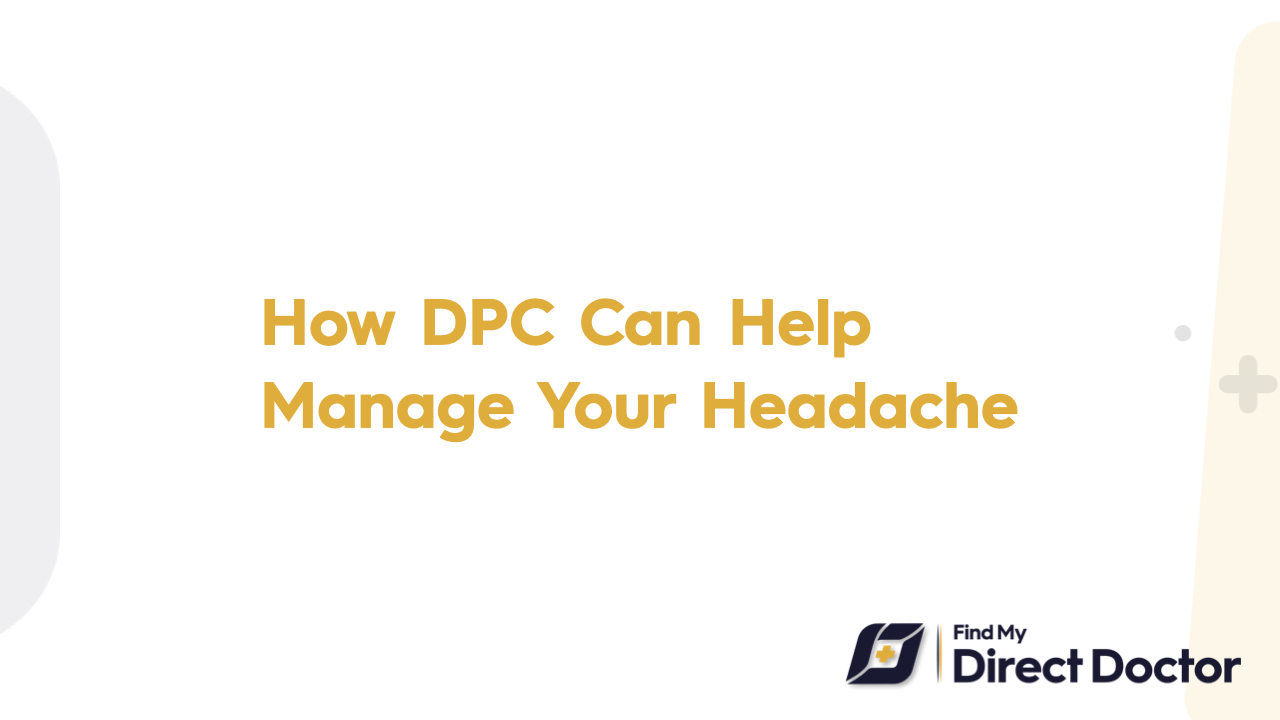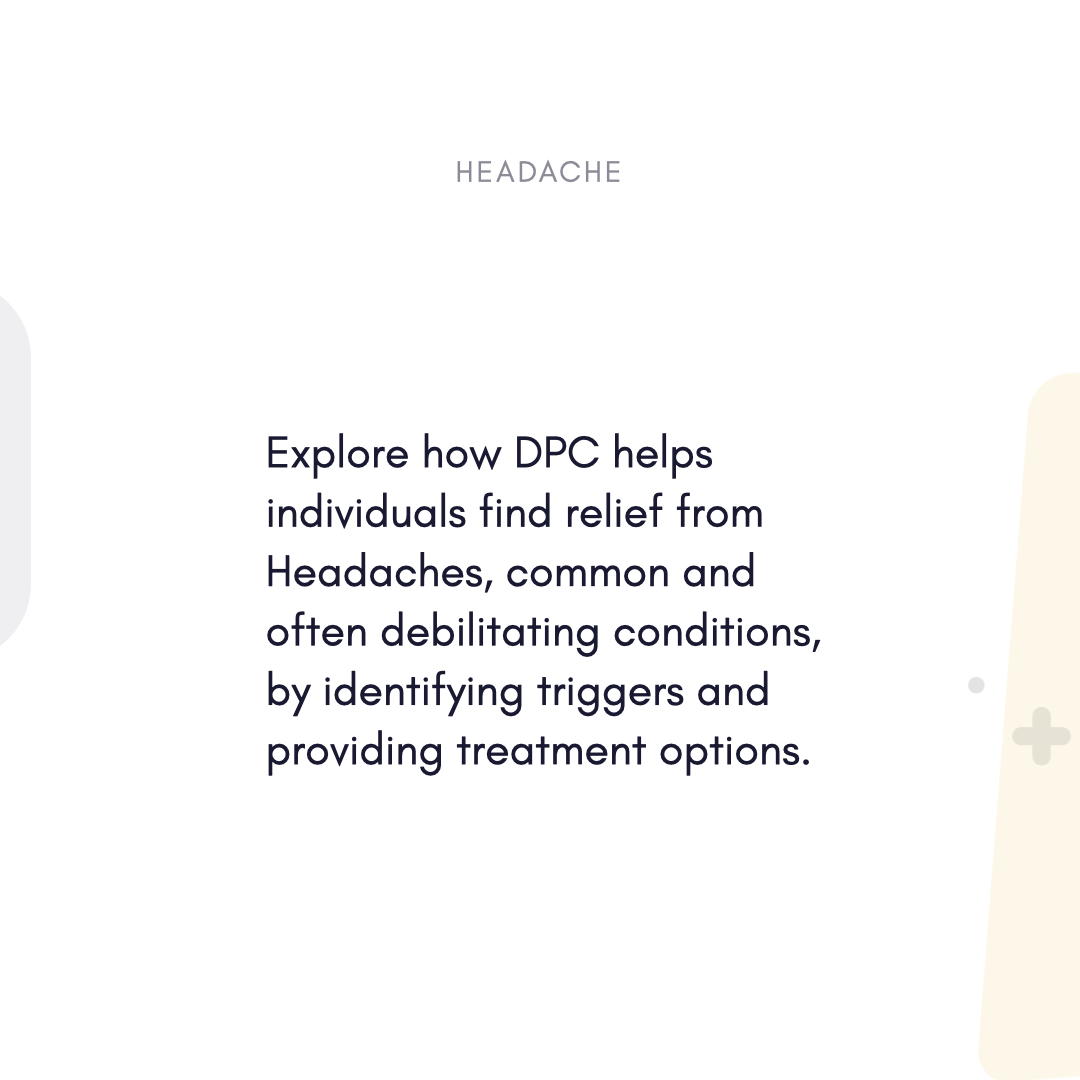Headaches and Direct Primary Care (DPC): Your Path to Personalized, Effective Relief
Millions of people suffer from headaches, ranging from tension-type pain to crippling migraines, frequently interfering with daily life. Prioritizing accessibility, continuity, and customized treatment, Direct Primary Care (DPC), a membership-based model with flat monthly fees, offers a transforming approach to headache management. DPC helps patients break free from the cycle of suffering by combining fast assessments, evidence-based therapies, and whole-person approaches.

Knowing the Types of Headaches
- Primary: Tension—band-like pressure; migraines—throbbing pain with nausea; cluster headaches—severe, one-sided pain.
- Secondary: Result from sinusitis, drug abuse, hypertension, or head injuries.
- Red flags: Sudden "worst headache ever," fever, confusion, or neurological abnormalities (such as slurred speech) that call for quick treatment.
- Diagnosis: Clinical history, physical examinations, and imaging (CT/MRI) only if red flags show themselves.
How DPC Improves Headache Management
How DPC Changes Headache Care
-
Quick Review and Correct Diagnosis:
- Same- or next-day appointments: Rule out crises (such as meningitis or stroke) and stay away from needless imaging.
- Using thorough patient histories and symptom diaries, identify dietary, hormonal, or stress-related triggers.
-
Customized Approaches of Treatment:
- Acute Relief: Write prescriptions for NSAIDs, antiemetics, or triptans—migraines—for nausea.
- Preventative Strategies: For chronic migraines, beta-blockers, CGRP inhibitors, or anticonvulsants.
- Non-Medication Interventions:
- Lifestyle changes: Trigger avoidance, hydration, and sleep hygiene.
- Stress management techniques: Mindfulness, biofeedback, and cognitive-behavioral therapy (CBT).
-
Coordinated, Long-Term Care:
- Specialist cooperation: Work with physical therapists for tension headaches related to posture or neurologists for refractory cases.
- Make detox plans for rebound headaches brought on by excessive NSAID or opioid use.
Key Benefits of DPC for Headache Patients
-
Improved Continuity and Accessibility:
- 24/7 Telehealth: Attend to medication questions or unexpected migraines without an ER trip.
- Track frequency of headaches, treatment effectiveness, and trigger patterns over time.
-
Patient-Centered, Holistic Focus:
- Customized plans: Change treatments depending on individual responses (e.g., hormonal therapy for menstrual migraines).
- Coordinate with experts for comprehensive support—nutritionists, mental health professionals, or both.
-
Savings and Cost Transparency:
- Flat monthly fees (USD 50–150) cover unlimited visits, follow-up appointments, and basic medications—no surprise bills.
- Using proactive management helps lower expensive ER visits and specialist referrals.
DPC Headache Management Personalized Approach
- Tailored Strategies for Migraines:
- For high-risk patients—that is, those with visual problems—prescribe preventive drugs.
- Dietary changes: List and cut off triggers including MSG, aged cheeses, or caffeine.
- Tension Headache Relief:
- Ergonomic corrective actions: Team with physical therapists for stretches and posture correction.
- Short-term muscle relaxants or acupuncture for persistent neck/shoulder tension.
- Prevention and Continuous Care:
- Gradually reduce rebound headaches from medication overuse.
- Teach patients to apply preemptive actions and identify early warning symptoms.
Real-World Success Story
- Following years of ineffective treatments, Mark's DPC provider found that his main migraine triggers are stress and inadequate sleep.
- Prescribed preventive topiramate and walked him through CBT to help with stress.
- Worked with a neurologist to rule out other causes.
- Mark's migraines went from 20 to 4 episodes a month, restoring his quality of life.
Frequently Asked Questions About DPC and Headaches
- Q: When should I start to worry about a headache?
- A: See a doctor right away for fever, confusion, sudden or severe pain, or neurological problems.
- Q: Can DPC assist with stress-induced headaches?
- A: Exactly. DPC combines lifestyle coaching with stress management—CBT, mindfulness.
- Q: Are triptans safe for everyone?
- A: No—avoid under controlled hypertension or heart disease. DPC starts by reviewing your background.
- Q: How does DPC treat chronic migraines?
- A: Custom preventive plans (meds, trigger elimination) and frequent follow-ups for tweaks.
How DPC Specifically Helps Headache Patients
- Timely Interventions: Use same-day evaluations to prevent ER visits for sudden or worsening pain.
- Customized Plans: Address diet, sleep, hydration, and stress.
- Seamless Coordination: With experts, dietitians, and mental health professionals.
- Transparent Pricing: Predictable costs for continuous care help lower financial stress.
Take Control of Your Headache Journey
Your life need not be under control by headaches. Without insurance hassles, DPC gives you a partner who provides fast relief, customized prevention, and relentless support. All set to confidently manage headaches? Look for a DPC provider close by and enjoy proactive, patient-centered care.






